|
The Square / St Mary's Road
Elham
01303 840242
www.thekingsarmselham.com
https://whatpub.com/kings-arms
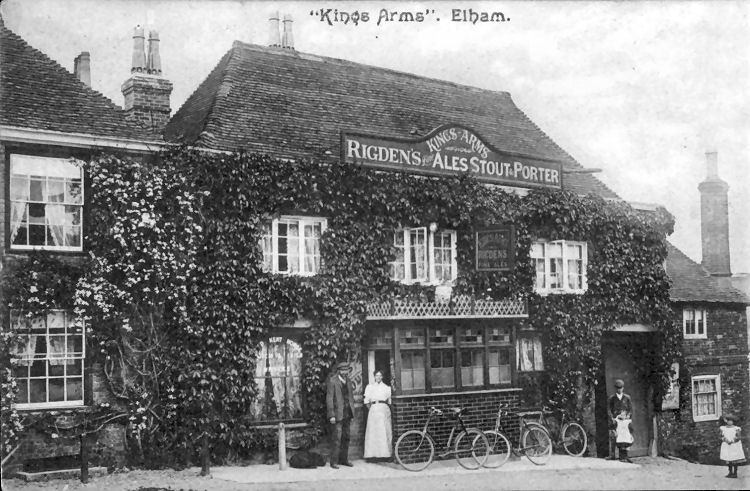
Above postcard, circa 1900. This was an advertising postcard that also
said the following:- " The Noted House for Luncheons, Dinners, Teas,
Large Room for Parties, G. D. Pitcher, proprietor." Kindly sent by Rory Kehoe. |

Above photo, circa 1900, kindly sent by Rory Kehoe. |
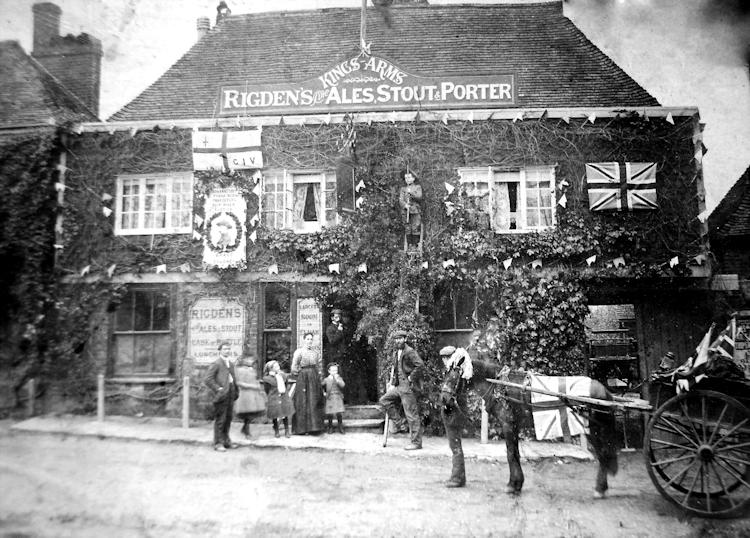
Above photo celebrating Colonel Mckinnons return from the Boer War in
October 1900. |
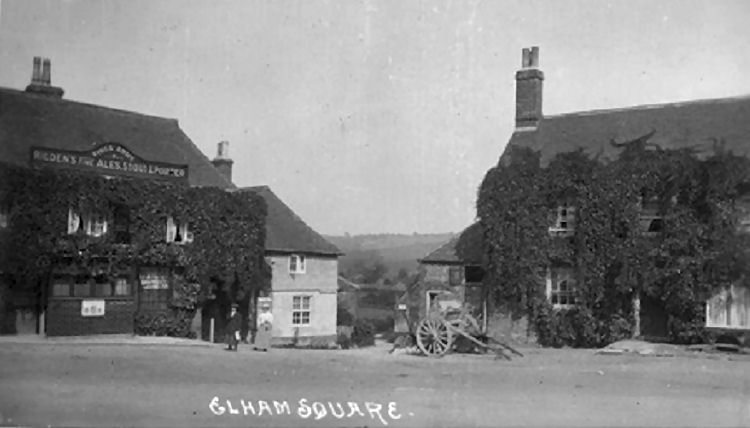
Above postcard, circa 1905, kindly sent by Rory Kehoe. |
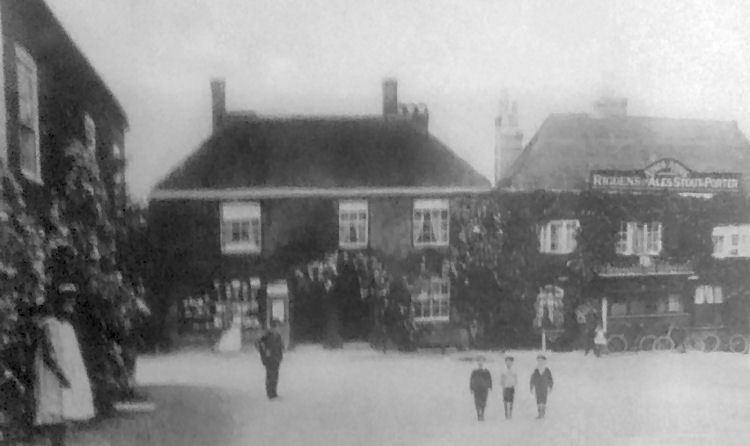
Above photo, circa 1906, kindly sent by Rory Kehoe. |
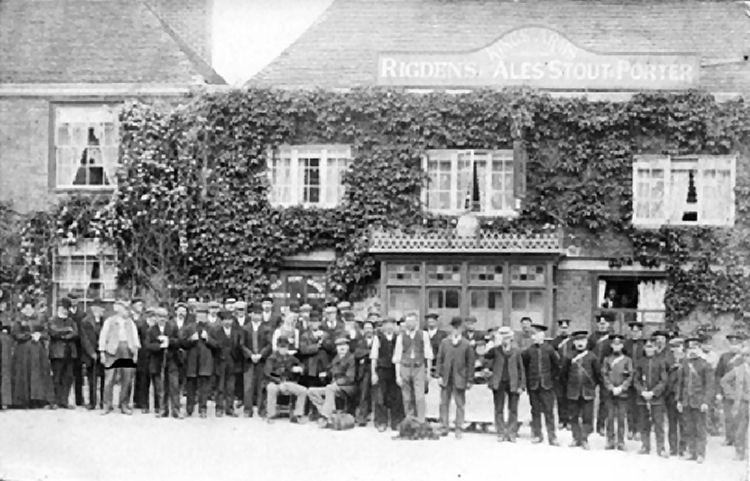
Above photo, circa 1910, kindly sent by Rory Kehoe. |

Above photo, circa 1910. Kindly sent by Rory Kehoe. |
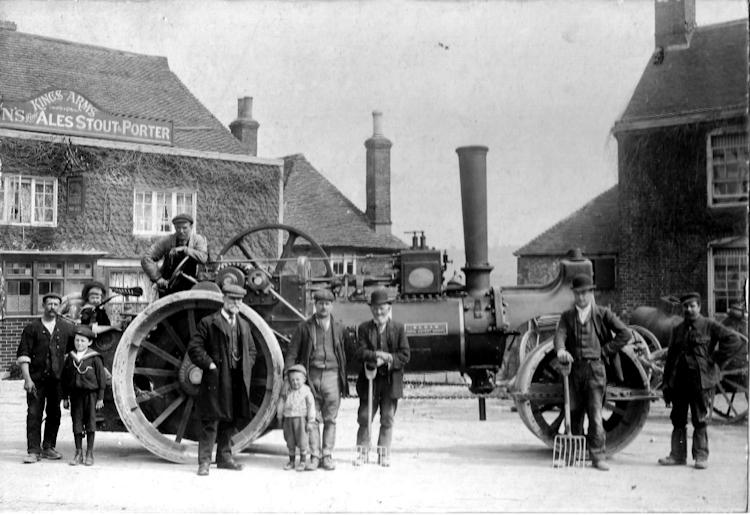
Above photo, date unknown. |
![King's Arms Remembrance Day soldiers]](2024-Photos1/Kings-Arms-Remembrance-Day-Elham.jpg)
Above photo showing two old soldiers relaxing after Remembrance Day, year unknown. |
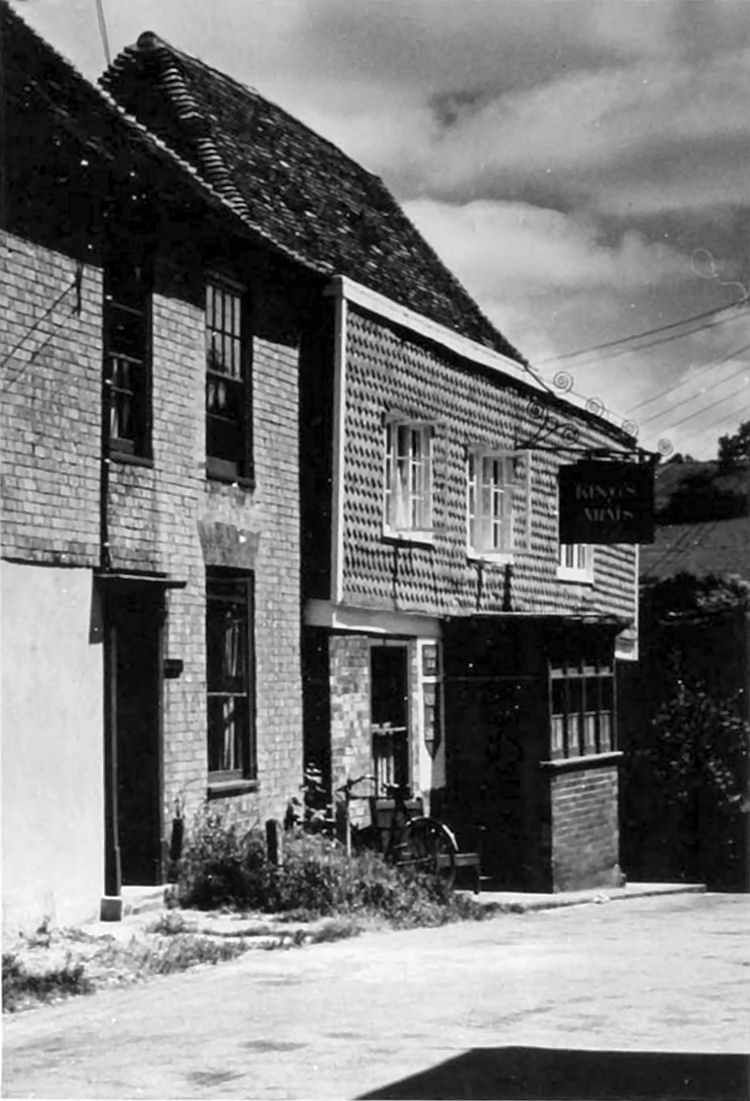
Above photo, 1949, kindly sent by Tim Timpson. |
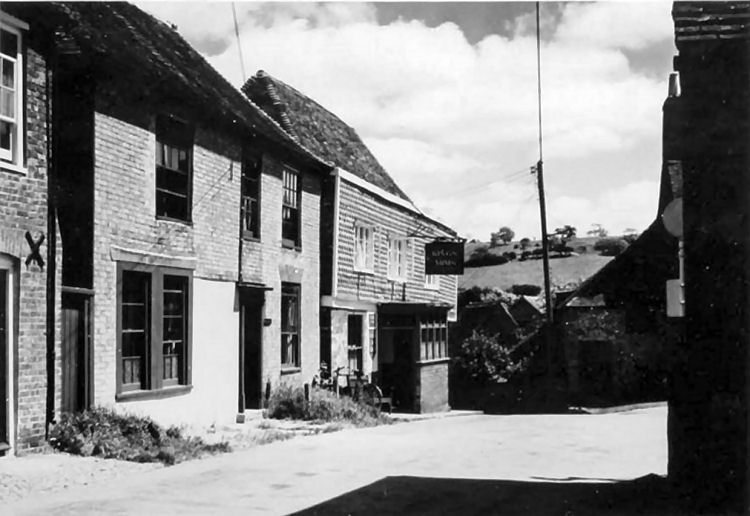
Above photo, 1949, kindly sent by Tim Timpson. |
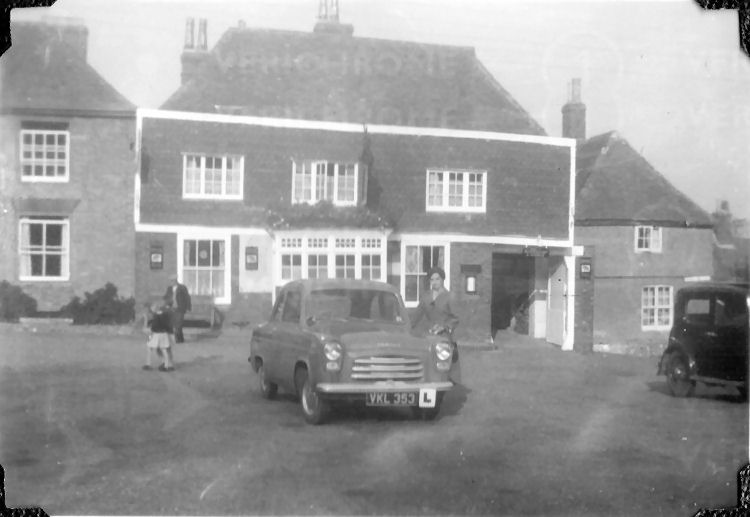
Above photo, 1950s, kindly sent by Paul Wells. |
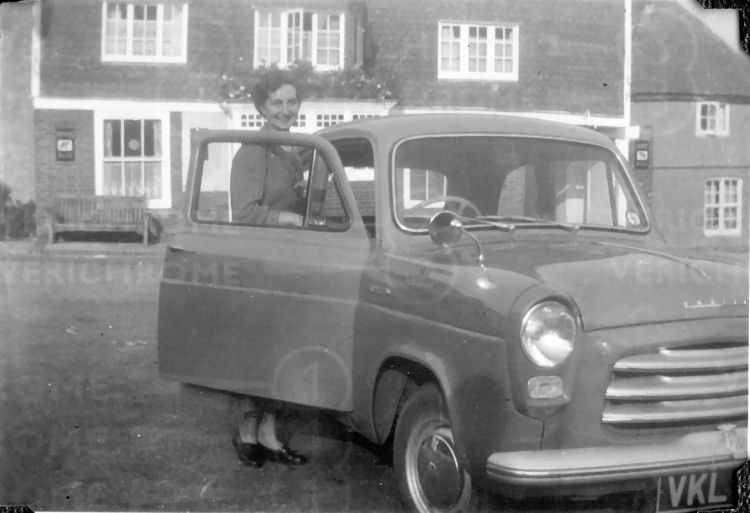
Above photo, 1950s, kindly sent by Paul Wells. |
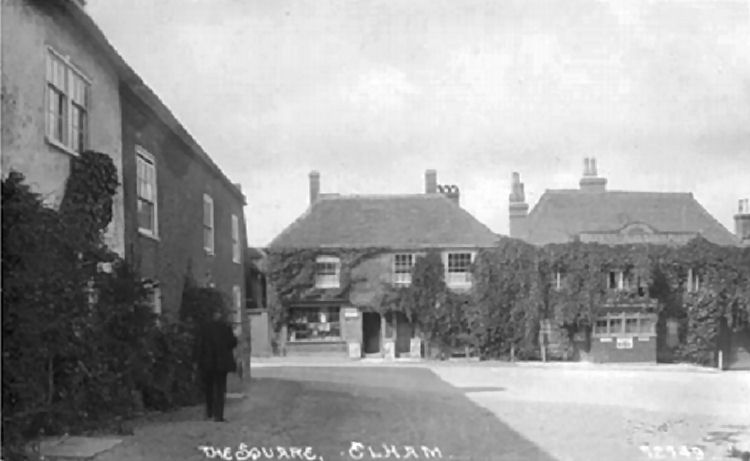
Above postcard, circa 1966, kindly sent by Rory Kehoe. |
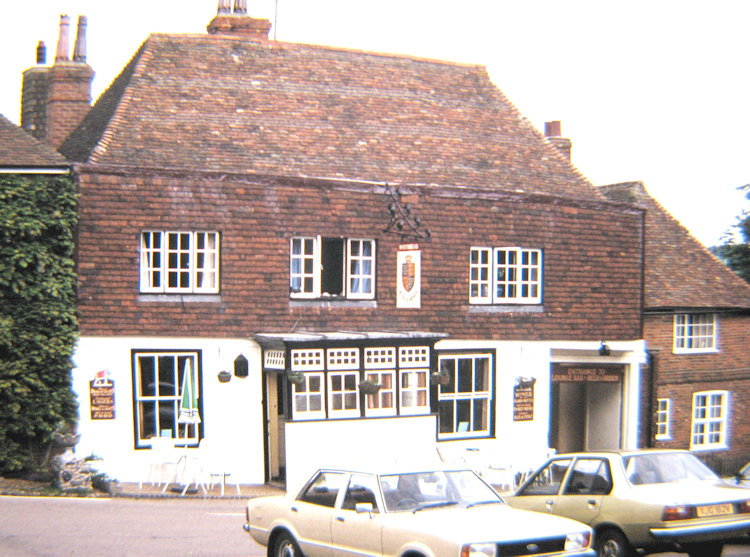
Above photo, 17 June 1985, by Jim Ashby. |
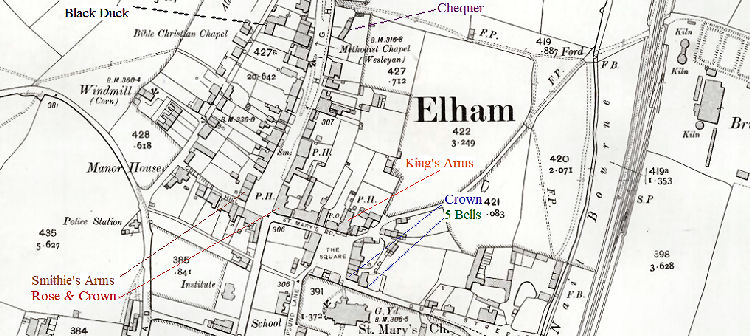
Elham O.S. Map 1896. |
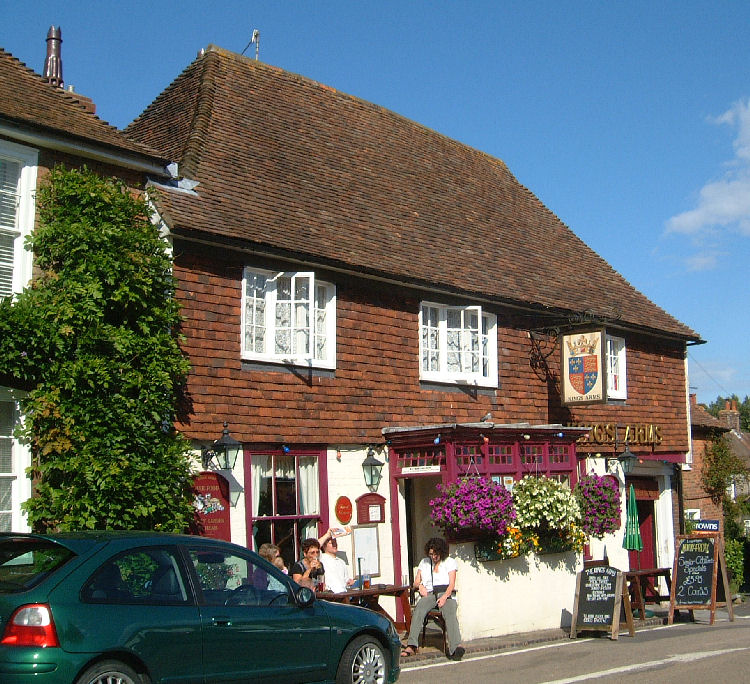
Above photograph by Paul Skelton, 22 Aug 2008. |
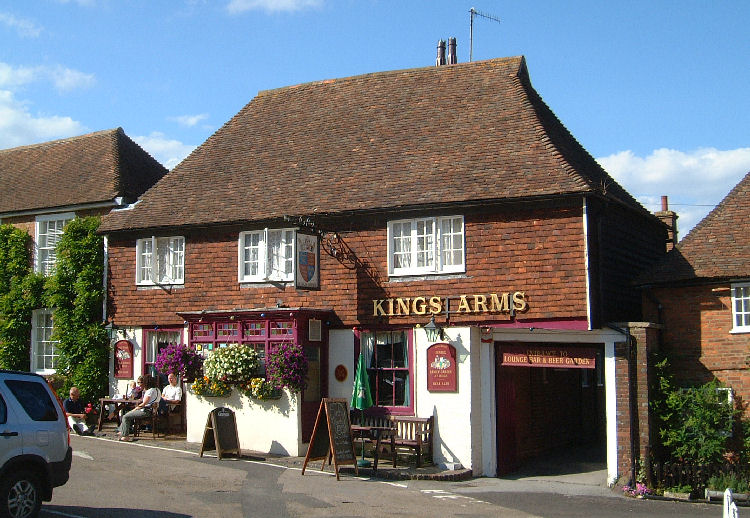
Above photograph by Paul Skelton, 22 Aug 2008. |
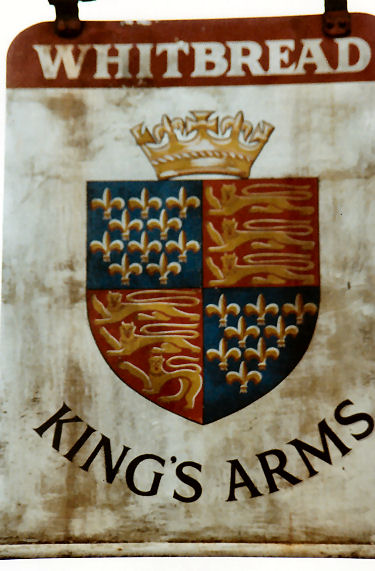 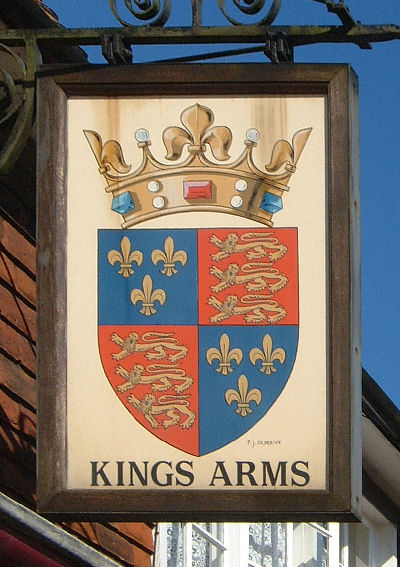
King's Arms sign left, March 1991 with thanks from Brian Curtis
www.innsignsociety.com Sign right by Paul Skelton, 22 Aug 2008.
Further details about Elham at
http://www.elham.co.uk/ 2006. |
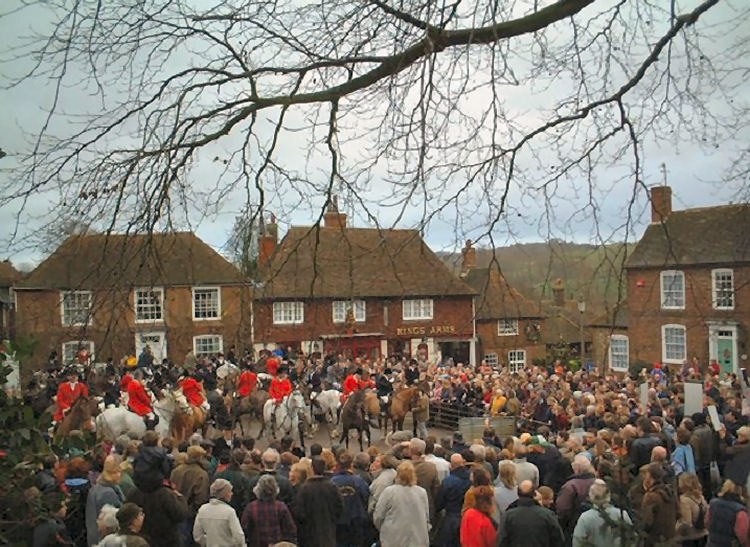
Above photo, 2002, kindly sent by Rory Kehoe. |
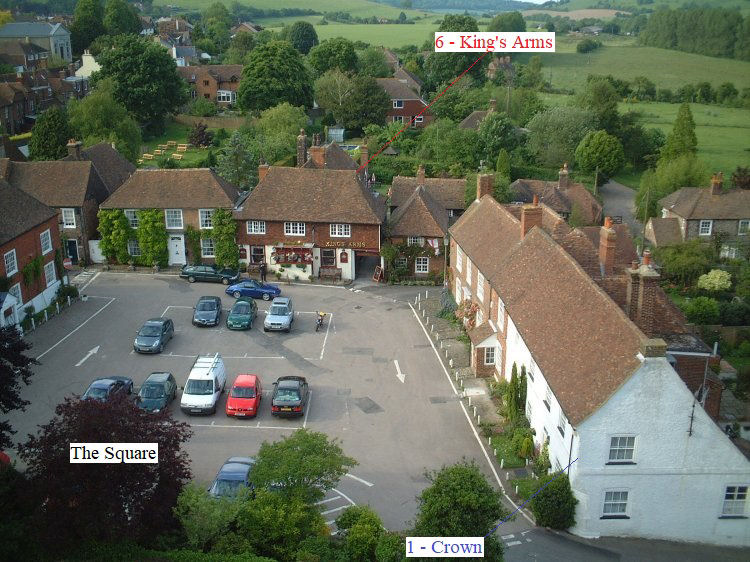
Above photo, 2005, kindly sent by Rory Kehoe. |
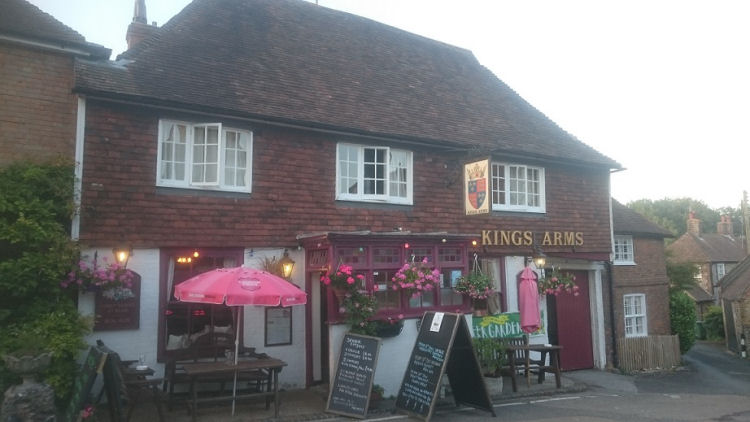
Above photo, July 2019 kindly taken and send by Rory Kehoe. he says the
premises also doubles as the local Post Office. |
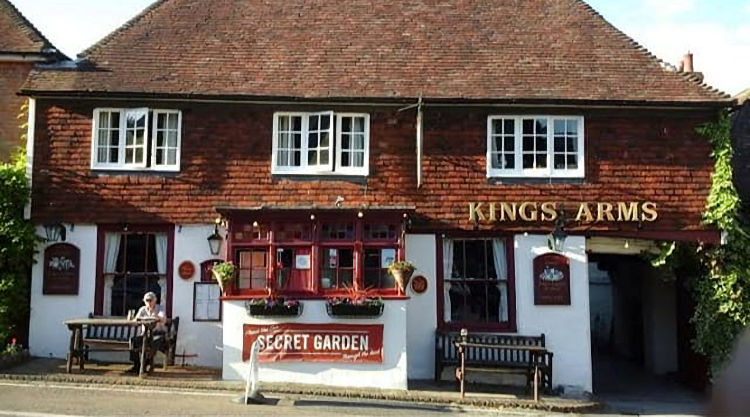
Above photo, 2021. |
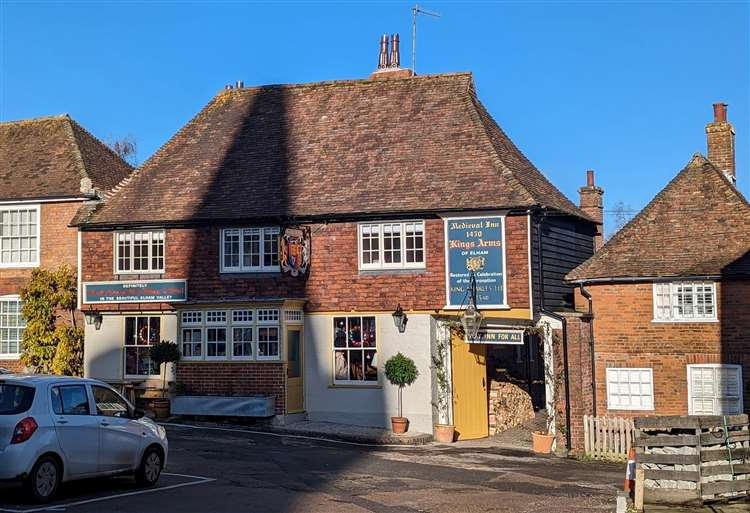
Above photo 2024. |
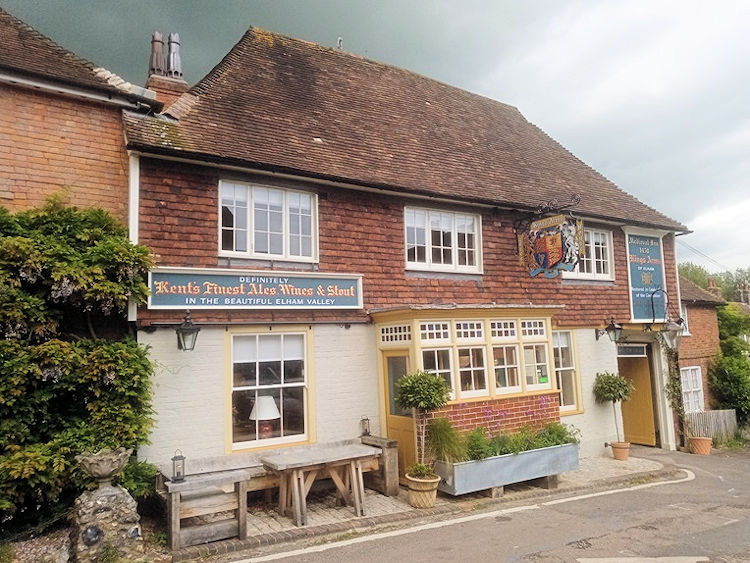
Above photo 2024. Kindly sent by Rory Kehoe. |
This pub was previously called the "Cock" due to cock-fights that took
place at what is now the rear of the pub and remained as the "Cock" until
1830 when it changed to the name we know today.
Reference should be made to the Swing riots of 1830 when farm
workers were smashing up mechanical machinery as it was taking their work,
it was said the first threshing machine was destroyed at Lower Hardres,
near Canterbury in East Kent, on the night of 28 August 1830, but this has
not been verified.
From an article written by Derek Boughton:- On 6 October, Ingram Swain,
who lived at Mill Down, but was in custody in Canterbury, really spilled the
beans. The magistrates had targeted him, because they believed, quite
wrongly, that he was a ringleader, having got ideas from West Kent men when
working with them on the harvest in the Isle of Thanet. Swain says “On
Wednesday about 6 weeks ago I met Selden Bayley in Mr Fagg's barley field at
Ottinge.”
He said “We broke a machine at Wingmore Court last night”
“How many of you?” “Three or four and twenty”
“We are going to break another tonight at Grimsacre – there will be 30 of
us tonight.” For those of you who don't know, Grimsacre is up the track from
Worlds Wonder, and Park Gate.
I asked him what time they were going to meet. “Eight o'clock at
Silverdown Gate”. There was nobody there – I went home to bed. Apart from
Sir Edward Knatchbull putting the date 25th Aug. against the name of William
Webb, nothing more is mentioned about the Grimsacre machine, but I can
confirm, through the late Wally Palmer, that it was destroyed. As to the
Wingmore Court machine, other evidence confirms that it was destroyed on the
night of Tuesday 24th August, so it was the very first.
Swain continues “The following Saturday I was at Ashbees the grocers in
Elham. I went from there with my father to the "Kings Arms" and had a Quart
of Beer in the Tap Room. Charles Carswell was there. (It sounds in fact as
if Charles Carswell was usually there. He was a 28 year old butcher, known,
according to Richard Marsh of Ottinge as “Fat One”, and John Cramp, who
worked for Mr Dodd at Hardres Court, gives a graphic description of him: “a
man dressed in a dark flap coat made use of a gross expression, and I
thought the voice was like Carswell's and I the more thought so on account
of his dress and the grossness of his language”).
This was a tied "Fleet Brewery"
pub in 1865 when the brewery was put up for auction. Rigden's bought it in
1865 and improved the property and added the porch in 1902. This porch now
(2019) houses the village Post Office.
|
From the Kentish Gazette, 25 March 1845.
The directors of the Elham £50 burial Society held their quarterly
meeting at the "Kings Arms" in on Wednesday last, when, on inspecting
the accounts, it appeared that only one death had occurred during the
last 12-months. Although this institution has been established 5-years,
we are informed that they have been only 5 deaths during that period. It
has not yet obtained its full number, but it is gradually increasing, 40
plus members having been admitted during the last year; and the scale of
payments, in proportion to the age of the members, on entry, is so
equitable, that there can be but little doubt of its future completion.
|
|
From the Dover Telegraph and Cinque Ports General Advertiser, Saturday, 3 October, 1846. Price 5d.
HORRID MURDERS AND SUICIDE AT ELHAM
A dreadful murder of a woman and child, with the suicide of the
perpetrator of the deed, took place on Wednesday morning, at Elham,
between the hours of five and six o'clock which has excited the greatest
horror and consternation throughout the neighbourhood.
Mr. T. T. DeLasaux, Coroner, on receiving information of the
catastrophe, lost no time in issuing his warrant for summoning a Jury,
and, early in the afternoon, the enquiry was gone in before him, by
which it appeared that Sharruck Rudd Bragg, bricklayer, had murdered his
wife and child, by beating them over the temples with a hammer, and
afterwards cutting his own throat.
When the deed became known, which was discovered through the blood
draining from the floor of the bed-room to the room below, the man was
dead, but the woman and child though totally senseless, still breathed.
The child, aged 5 years, died about two hours after the discovery was
made; but the woman lingered till about 10 o'clock in the forenoon, when
death put an end to her sufferings. When discovered, an infant aged 4
months, was found by the side of the woman, uninjured.
The Coroner, in opening the proceedings, explained to the Jury, it would
be their duty, first to enquire into the cause of the death of the man,
as also to the state of his mind he was at the time he perpetrated the
deed by which he had depraved himself of life; and the verdict which
they might feel themselves bound to return on that inquiry would guide
them to the verdicts on the other two bodies. From the evidence adduced
no doubt could exist on the question as to the man at the time being
insane, and verdicts to that effect were accordingly returned.
|
|
From the Kentish Gazette, 6 October 1846.
MURDERS AND SUICIDE.
On Wednesday great horror prevailed at Elham and the surrounding
neighbourhood, distant a few miles from Canterbury on the Hythe road, by
the discovery of the murder of a woman and her daughter, and the suicide
of the perpetrator of the deed. Richard Bragg, a bricklayer, lived in a
house occupied also by other persons, who, for same time past, had
observed him in a low desponding way. At an early hour on Wednesday last
while his wife was in bed with an infant by her side, he struck her
several violent blows on the temple with a hammer which rendered her
insensible, and then committed the like violence on their child five
years old, which lay in a side bed, leaving an infant unhurt. He
afterwards committed suicide by cutting his throat. The discovery was
made by some blood running through the floor into an under room, when
the chamber was opened, the suicide's dead body was found on the floor
streaming in blood, and the mother and daughter in the agonies of death.
Mr. T. T. Delasaux, the coroner, summoned a jury in the afternoon at the
"King's Arms," to enquire into the cause of the deaths.
The following evidence was adduced:-
William Jaggers, of Elham, schoolmaster, stated that he had lodged at
the houae of the deceased about ten months. The family consisted of
Bragg, his wife, and two children, the eldest a girl, aged about five
years, and an infant, aged about four mouths. The conduct of the
deceased man towards his wife and children had been most kind. He had
frequently appeared low and melancholy during the last month. Witness
went to bed about half-past ten last (Tuesday) night. The deceased, his
wife, and children, had retired before that time. He did not hear any
noise in the bedroom of the deceased. About half-past five in the
(Wednesday) morning he heard something heavy full on the floor in the
chamber of the deceased; shortly before which he believed he heard the
wife of the deceased groaning. About five o'clock, he heard a person
call the deceased by the name of Sharruck, and he believed he heard him
answer. The wife continued to groan, and for some time the groans
continued louder, appearing to be at a greater distance. About six
o'clock witness got up and dressed himself, and on looking out of the
window saw a little girl knocking at the front door. He went down stairs
and opened the door, but the child was gone. He then discovered some
blood lying on the floor of the foreroom, which is under the chamber of
the deceased, and on looking up he perceived more coming through the
ceiling. He thereupon called Mrs. Quested, desiring her to go and open
the bedroom door of the deceased. He occupied a sitting room and bed
room in the same house. He had seen in the washhouse of the deceased a
hammer similar to that produced; it had been used for breaking up coals.
The wife of the deceased was a quiet well conducted woman.
Ann, the wife of Richard Quested, blacksmith, stated that at about half
past six this morning, she was called by last witness, and went to the
bedroom of the deceased, and saw the deceased lying on the floor,
covered with blood. The bed was also saturated with blood, and she heard
the infant cry.
Richard Foreman, carpenter, deposed, that for about the last six weeks
deceased had been low and melancholy. He saw him last evening at his own
house, and remained with him about three quarters of an hour. He was
then low spirited, and complained of two or three things as annoying. He
always appeared very fond of his wife and children, and behaved
affectionately towards them. He stated he had not lived a good life, and
he feared there was no mercy for him. During the last six weeks he had
attended at chapel more frequently, sometimes on a week day.
James Bragg, bricklayer, brother to deceased, examined:— Deceased had
laboured under a depression of spirits for the last month. Was at work
with him about three weeks ago; he was then strange in his conversation,
and different from what he had been in the habit of being.
Clement Riches, bricklayer, of Elham, deposed to the same effect.
Richard Vidgen, hairdresser, identified the razor produced as having
belonged to the deceased, and which he set eight weeks ago.
Sarah, the wife of James Bragg, deposed to deceased's spirits having
been much depressed for the last six weeks, but from what cause she did
not know. The depression of spirits commenced at the period he left off
going to church, and attending chapel. She was one of the first to enter
the bedroom that morning after the deed, and found a razor covered with
blood, lying in a chair. She took the infant from the bed, the mother
being perfectly insensible and groaning. The other child was also
groaning, and was covered with blood; she was lying in a side-bed. The
man was lying on the floor quite dead.
George Gale, tailor, corroborated the last witness. He also saw the
razor now produced lying in the chair, and the hammer on the floor near
the deceased.
James Beattie, surgeon, of Elham, had been sent for to the house that
morning. The throat of the deceased man was cut. His wife was in the
agonies of death, her head being covered with blood. On entering the
room, he saw on the left hand a large pool of blood, and near it the
hammer produced. He found, on examination, that the right temple bone
was fractured protruding through the skin, and the other end forced into
the brain, which was consequently exposed. Further injuries on the head
and face were also perceptible, and the right eye was destroyed. Blood
was flowing from the temporal artery. The injuries, which were the cause
of death, appeared to have been inflicted by a blunt instrument, like
the hammer, and by a right handed person. He believed the first blow
must have rendered her insensible. He found the left temple and left
mallor bone of Ellen Bragg the child, fractured, with a large lacerated
wound over the mallor bone—which injuries were sufficient to have caused
death, and were, doubtless, inflicted by a heavy instrument like the
hammer. The child, who was insensible, died about eight o'clock.
The jury having heard the evidence, returned verdicts that the deceased,
Sharruck Richard Bragg, committed suicide while labouring under insanity;
and that he killed and slayed Mary Bragg, his wife, and Ellen, his
daughter, while in that state of unsound mind, and that, therefore, the
act was not felonious.
|
|
From the Dover Telegraph and Cinque Ports General Advertiser, Saturday, 10 October, 1846. Price 5d.
THE ELHAM TRAGEDY
Our Journal of Saturday last furnished a succinct statement of this
tragic affair, which occurred on the morning of the previous Wednesday;
we have since been enabled to obtain additional peculiars, of which the
following is a condensed report:-
The Coroner having opened his court of enquiry, which was held at the
“King's Head,” the Jury at once proceeded to the cottage of the
deceased, near Elham mill. On entering the chamber the first thing that
presented itself to the view was the lifeless body of Bragg, extended on
the ground, with his shirt dyed in blood, and a large gash in his
throat. On the bed lay the body of his unfortunate wife, and near the
foot of the bed lay the body of the child Ellen, both weltering in gore,
and exhibiting marks of the most fearful violence. Having viewed the
body, the Jury returned to the “King's Head,” when the evidence as
follows was given:-
William Jaggers, schoolmaster to the British and Foreign school
established at Elham, stated that he lodged with deceased, and had done
so for the last ten months; that deceased and wife appeared to live very
comfortably together; deceased always appeared very fond of her, and
also of his children, which were two, Ellen the deceased child, aged
five years, and a baby about 4 months' old. About four weeks ago the
deceased came into witness's room, and said he expected to be
transported, but he did not give any explanation why he apprehended that
he should be so punished; when asked by witness what law he had broken
that deserved such a sentence, he said he had been a bad man, and had
not acted rightly towards his wife; but he did not say in what manner.
Witness spoke to Mrs. Bragg respecting what deceased had said, when she
replied that he had never struck her in his life, nor swore at her,
except when she had been out and got tipsy, but this he had not been in
the habit of doing often, nor lately, and she added, that when he came
home from his work, on the days of the last monthly meeting of the
Magistrates at Elham, he asked her if she had not been to the monthly
meeting to take out a warrant against him. From this time up to that of
his death he appeared low and melancholy. On Wednesday morning, shortly
after 5, witness heard something fall heavily to the ground in
deceased's bed-room, and immediately after heard groans, which he
thought came from Mrs. Bragg, and he concluded that she had been taken
ill. On going downstairs he discovered a quantity of blood on the floor,
which had drained through the ceiling and down the walls from the
deceased's chamber. Witness was alarmed, and immediately applied to the
neighbours for assistance, when Mrs. Quested went up to deceased's room,
and returned immediately, saying that Bragg had cut his throat. Witness
then went down the street, to give information and procure further
assistance. – This evidence, as far as it concerned herself, was
corroborated by Mrs. Quested.
Richard Foreman, carpenter, was next examined. Had known the deceased
for the last 20 years, and had visited him at his house the previous
evening. He was not then so low in spirits as he had at other times seen
him, but there was something preying on his mind.
Sarah Bragg, wife of deceased's brother: In consequence of hearing that
deceased had cut his throat, witness went up to the bedroom, and saw her
sister on the bed, and in the state seen by the Jury, moaning and
insensible. Witness passed round the bed by the body of her brother to
take the baby and saw in the little side bed the child Ellen, who was
not dead, but in the same state in insensibility as her mother.
Several other witnesses were examined, but no further arterial evidence
was elicited; and the Jury, after a brief address from the Coroner,
returned the following verdict:- “That Sharrack Rudd Bragg had died by
cutting his throat, being at the time labouring under temporary
insanity;” and “That Sharrack Rudd Bragg slew Mary his wife, and Ellen
his child, being at the time he committed the act not in a sound state
of mind.”
The interment of the bodies took place on Sunday morning last, and was
witnessed by a large concourse of spectators. An extensive circle of
relations and friends of the deceased followed the bodies to the grave,
who afterwards retired to the church, and attended divine service, when
an impressive sermon was delivered by the Rev. W. Woodhouse, the
minister of the parish, to a very numerous congregation.
|
|
From the Whitstable Times, 1 March, 1902.
ELHAM. AN OLD LADY’S FATAL FALL.
The East Kent Coroner (Mr. B. M. Mercer) held an inquest at the “King’s
Head,” (sic) Elham, on Tuesday, touching the death of Mary Whitnall, aged 90. It appeared that on Tuesday the 18th inst., when Richard Whitnall, a
son, got up to have his breakfast he found deceased lying on the floor
downstairs where she slept. The deceased died on Sunday the 23rd at 5
a.m. Mr. Percy Charles Burgess, surgeon at Elham, was called in to see
the deceased on Tuesday the 18th and found her in bed in a collapsed
condition. There was an abrasion on the side of both legs and on the
side of the head. The deceased had been some hours on the floor, and it
was a cold nights. Death in the surgeon's opinion was due to shock from
the fall and exposure and senile decay. The jury returned a verdict of Accidental Death. |
|
From the Dover Express, 20 February 2003.
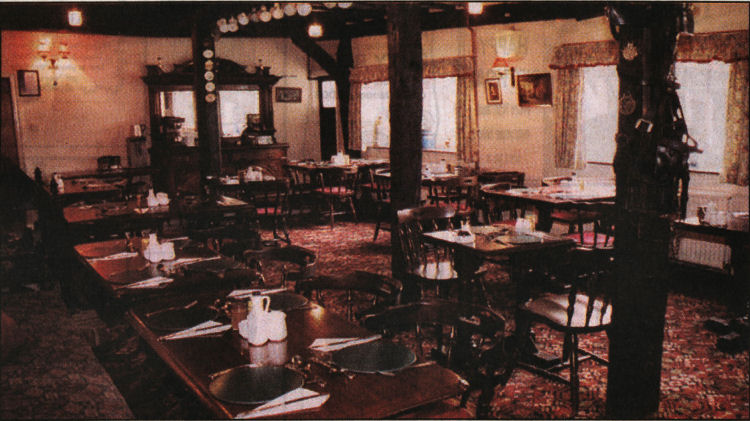
Relax and enjoy the King's Arms.
DATING back to the early 15th century, the King's Arms in the pretty
village of Elham is a traditional English pub.
Originally a grain-store,
the building became a brewery supplying ale to local hostelries before
being licensed as a pub.
Debbi and Barry Preston took over the Kings
Arms nearly a year ago. (2002) Debbi said: "The King's Arms is a lovely pub
and one of the oldest buildings in the village. There have been just two
landlords here in the past 40 years and I think that demonstrates the
happy and warm atmosphere."
On cold winter days, open fires blaze in the beamed bar and the separate
restaurant. Customers can relax and choose from an extensive menu.
Delightfully varied, the dishes on offer at the Kings Arms are all
prepared and cooked to order. Snacks and light meals such as sandwiches,
baguettes, baked potatoes with your choice of filling and ploughman's
lunches are featured along with meals for those with a bigger appetite.
Prime quality steaks and delicious pies are included on the menu as well
as a choice of fish dishes. There is a frequently changing specials board and a list of truly scrumptious
desserts.
Traditional Sunday lunches are served with a choice of four
roast meats and a vegetarian option at a surprisingly affordable £5.95.
The King's Arms is very much the centre of village life, with locals and
visitors alike appreciating the friendly, welcoming atmosphere.
Debbi
and Harry have hit upon a winning formula incorporating traditional
values of hospitality and excellent fare. For further information call
01303 840242.
Below is shown an advert that appeared in the Dover Express, 20 April
2003.
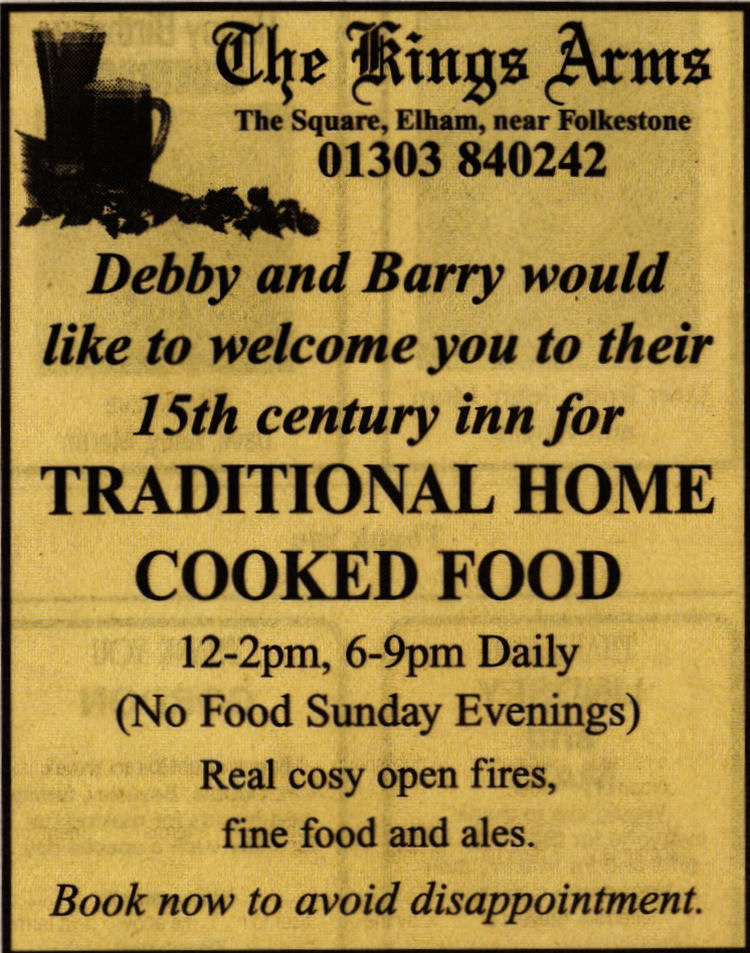
|
|
Advert appeared in the Dover Express, 12 May 2003.
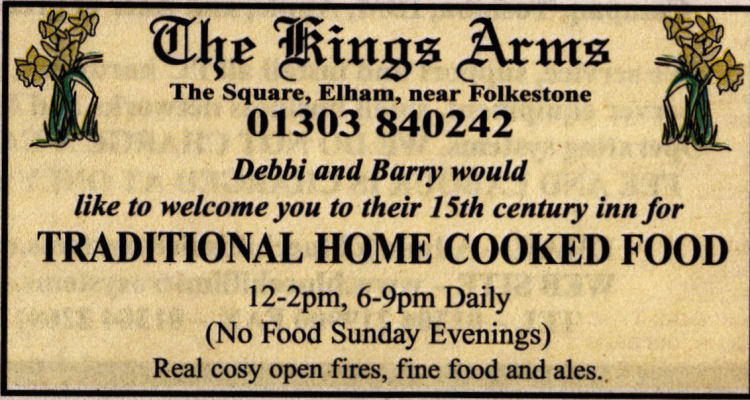 |
|
From the
https://www.kentonline.co.uk By Chris Price, 17 August 2016.
Grade II listed pub the Kings Arms in Elham put up for sale.
A Grade II listed pub has come on the market for £115,000.
The Kings Arms in Elham, between Canterbury and Folkestone, has been run
by its present owners for 13 years.
The pub, which has a beer garden capable of holding 60 people, has a
main bar and a restaurant at the back.
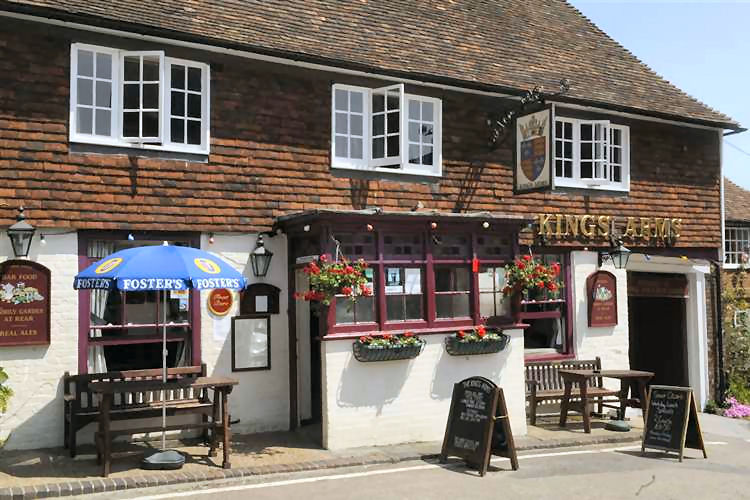
The Kings Arms in Elham.
There are three double bedrooms above for the new owners, plus a
bathroom and large living area.
The pub has gone up for sale with Christie & Co, which is selling the
leasehold, which carries an annual rent of £24,384.
Business agent James Hughes, at the advistor’s Maidstone office, said:
“The Kings Arms is located in a lovely village and possesses all of the
charm and character that you would want in a pub.
“The market is very buoyant in villages surrounding Canterbury, due to
the beautiful locations and wide ranging footfall, and this would
provide the perfect opportunity for someone who wished to take over a
successful, established business.”
|
|
From the
https://www.kentonline.co.uk By Louis Walker, 10 April 2024. The
King’s Arms in Elham near Folkestone recognised as best pub in Kent.
A family-run business has seen one of its pubs named the best in Kent
for the third year running.
The King’s Arms in Elham is a Grade-II listed 15th-century inn owned
and managed by Contemporary Pubs.
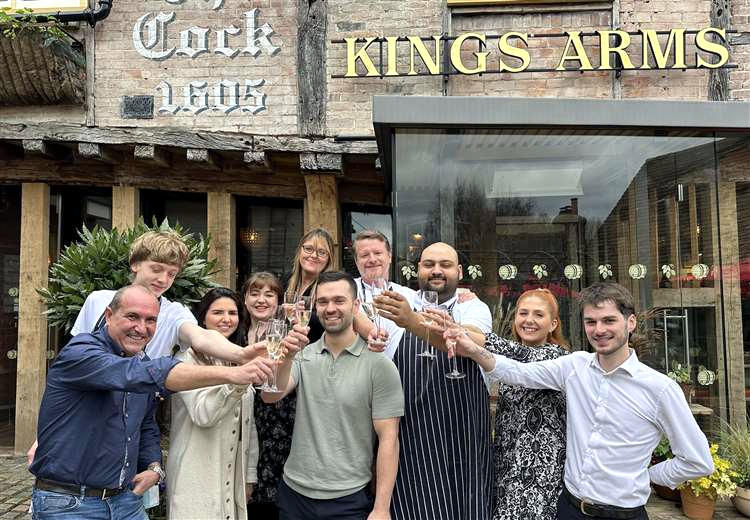
Just six months after opening, the King's Arms pub in Elham has been
recognised as the best pub in Kent at Pub & Bar magazine's annual
awards. Picture: Maxim PR/Contemporary Pubs.
It was awarded the accolade at Pub & Bar magazine’s 2024 National Pub &
Bar Awards and follows success for the company’s other two pubs.
The "Tiger Inn" at Stowting and the
"Marquis of Granby" in Alkham both won
the award in 2022 and 2023, respectively.
Managing director, Will Sheldon, who was born and raised in Elham, was
happy to see their latest offering recognised with the award.
He said: “Our business is all about pubs and for The King’s Arms to win
a national award just over six months after opening is a testament to
the whole team.
“We take unloved pubs, sensitively breathe life back into them and put
them at the heart of the community. It’s critically important to have a
highly trained and motivated team to deliver the best quality local food
and drink offerings.
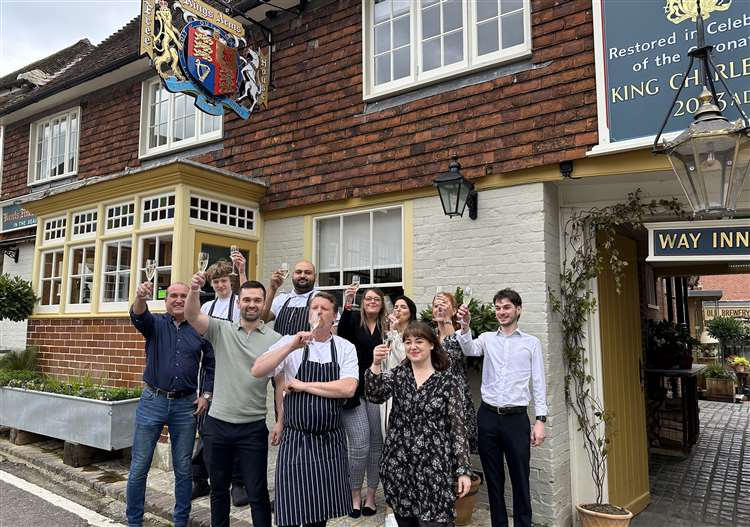
Team members at The King's Arms in Elham celebrate the award. Picture:
Maxim PR/Contemporary Pubs.
“We are in a very competitive market, with people rightly being careful
about where they go and what they spend, this award will strengthen our
already strong reputation across east Kent.”
The pub was purchased from the Stonegate Group in October 2022 and then
refurbished by Contemporary Pubs before re-opening in September.
The work included an extension to the pub, the installation of a
state-of-the-art kitchen and back-of-house facilities for its 25-person
team.
Our reviewer took in the pub in December after exploring the Elham
Valley trail and hailed the “warm welcome” and “perfect fare” on offer.
Hugh Thompson, Contemporary Pubs’ group manager, praised the team behind
all three pubs, which has helped them achieve national recognition.
He said, “We’ve developed a business model that works. We’ve created
three exceptional pubs, each with its own personality, great atmosphere,
and fantastic team delivering consistently great food and service.
Tristan O’Hana, Pub & Bar magazine's editor said they want to play a key
role in promoting venues across the country.
They added: “Pubs and bars are facing some of the biggest challenges in
recent history, so if the National Pub & Bar Awards can help by lifting
sales across these venues, then we’re delighted to play our part.”
The King’s Arms will now go head-to-head with the 94 county winners for
the regional and national titles at the National Pub & Bar Awards Grand
Final on June 26 in London.
|
|
From the
https://www.kentlive.news By Freya Ebeling, 22 June 2024.
Kent's 'best pub' with 'superb food' wins another award for
'spectacular' refurbishment.
Nestled in the heart of this picturesque Kent village, it has become a
favourite spot for pub enthusiasts and walkers alike.
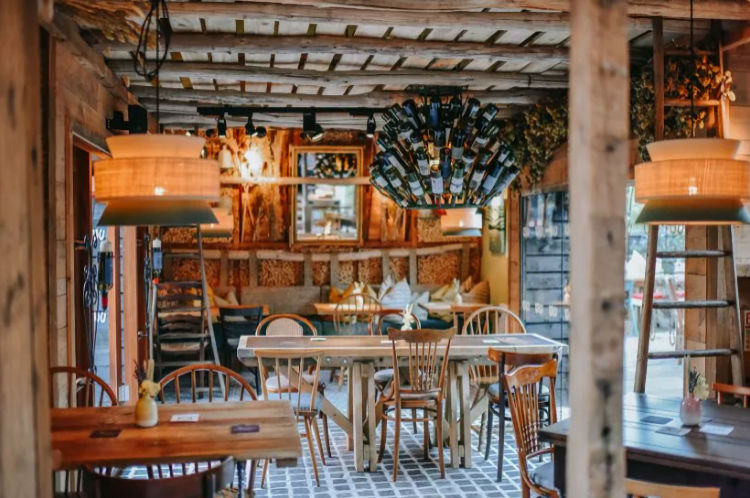
Situated in the sought after Elham Valley, this beautiful Grade II pub,
The Kings Arms, has been restored (Image: Fleur Challis Photography)
A Kent pub, already a three-time winner of Kent's best pub title, has
added another feather to its cap. The Kings Arms in Elham has now
clinched the prestigious CAMRA Refurbishment award, showcasing its
successful blend of historic charm and modern appeal.
Nestled in the heart of the village, it has become a favourite spot for
pub enthusiasts and walkers alike, thanks to its prime location in the
North Downs between Folkestone, Dover, Ashford and Canterbury. Best
described as gastrofood with a twist, The King's Arms offers visitors
locally-sourced food, beer and wine, in a historic village setting.
Contemporary Pub's managing director, Will Sheldon, was born and raised
in Elham.
The interior remains true to its historic origins: once a grain store,
the pub now presents its wines amidst a shelf of hanging grain crops,
juxtaposing with the more modern instalments of mirrors, vases, and
trendy geometric cushions.
The exposed beams offer a rustic effect, yet the refurbishment succeeds
in the difficult feat of clinging to the space’s authentic origins
whilst transforming it into a fresh and trendy spot for a pint.

The Kings Arms sits in the heart of the picturesque village of Elham
between Folkestone and Canterbury (Image: Fleur Challis Photography)
The garden is cozy and classic, adorned with zests of colour that
anticipate the joy of a Summer evening spent tucking into a tapas dish
(their menu promises a tapas night at the beginning of August, an event
we can only imagine to be unmissable). It is no surprise that the pub
stormed CAMRA’s competitive refurbishment category and proved itself
once more as one of the best pubs in Kent.
And the refurb is already going down a storm with customers. One recent
review 2024 reads: "We visited for Sunday lunch having heard about the
pub's makeover and were not disappointed. The refurb is spectacular and
the food, service and wine all excellent. This is probably now my
favourite pub in Kent"
Another added: "Superb food, with generous portions, so generous I
couldn’t fit in a pudding. The Kings Arms is quite the entrance,
beautifully designed, a rustic feel, with modern and contemporary decor.
Attention to detail clearly runs throughout the pub, from its design,
decor, food and service. Food was very tasty, 10/10 on presentation and
the service provided was spot on!"
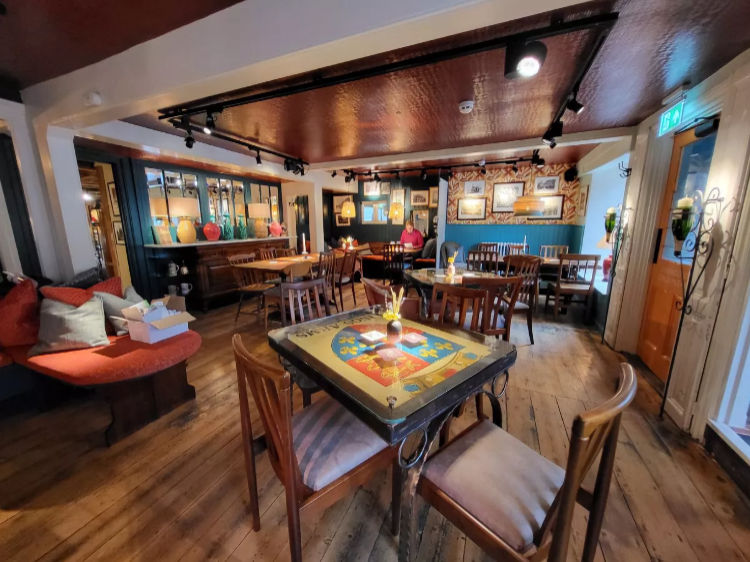 The Kings Arms in Elham won the Refurbishment category in the Campaign
for Real Ale’s Pub Design Awards.
Chair of the design awards judging panel Andrew Davison notes that “Our
Pub Design Awards recognise the high standards of flair and imagination
which have gone into these projects, and the ambitious craftsmanship
involved in the repair and conservation work. Despite everything thrown
at it, we believe that the pub has a key role to play in our
communities, and that it will continue to flourish as an institution.
The high quality of the entries for these Awards provides evidence to
support that belief.”
|
|
From the East Kent Mercury, 4 July 2024. By Freya Ebeling.
PUB PRAISED FOR MODERNISING WHILE KEEPING HOLD OF HISTORY.
AN Elham pub which is already a three-time winner of the Kent’s best pub
title has added another feather to its cap.
The Kings Arms in Elham has won the prestigious CAMRA Refurbishment
award, showcasing its successful blend of historic charm and modern
appeal.
Nestled in the heart of the village, the Kings Arms has become a
favourite spot for pub enthusiasts and walkers alike, thanks to its
prime location in the North Downs between Folkestone, Dover, Ashford and
Canterbury.
Best described as gastrofood with a twist, the pub offers visitors
locally-sourced food, beer and wine, in an historic village setting.
The interior remains true to its historic origins - once a grain store,
the pub now presents its wines amid a shelf of hanging grain crops,
juxtaposing with the more modern instalments of mirrors, vases, and
trendy geometric cushions.
The exposed beams offer 3 rustic effect, yet the refurbishment succeeds
in the difficult feat of clinging to the space's authentic origins while
transforming it into a fresh and trendy spot for a pint.
The garden is cosy and classic, adorned with zests of colour that
anticipate the joy of a Summer evening spent tucking into a tapas dish.
The award-winning refurbishment is
already going down a storm with customers. One recent review reads: "We
visited for Sunday lunch having heard about the pub’s makeover, and were
not disappointed.
"The refurb is spectacular and the food, service and wine all excellent.
This is probably now my favourite pub in Kent.”
Another customer wrote: "Superb food, with generous portions, so
generous I couldn’t fit in a pudding. The Kings Arms is quite the
entrance, beautifully designed, a rustic feel, with modern and
contemporary decor.
“Attention to detail clearly runs throughout the pub, from its design,
decor, food and service. Food was very tasty, 10/10 on presentation and
the service provided was spot on."
Andrew Davison, chairman of the judging panel which awarded the Kings
Arms its new title, said: "Our Pub Design Awards recognise the high
standards of flair and imagination which have gone into these projects,
and the ambitious craftsmanship involved in the repair and conservation
work.
"Despite everything thrown at it, we believe that the pub has a key role
to play in our communities, and that it will continue to flourish as an
institution. The high quality of the entries for these Awards provides
evidence to support that belief."
■ The pub can be found in St Mary’s Road, Elham. For more information
visit www.thekingsarmselham.com
|
LICENSEE LIST
GARLAND Charles 1841 (age 30 in 1841 )
(King's Buildings, High Street) )
(King's Buildings, High Street)
COLTHAM William 1841-58 (age 67 in 1851 ) )
 
COLTHAM John 1862-82+
 
PITCHER George Dixon 1891-1913+
  
FILE Leo John 1930-38+

ROWNAN William John 1948-60+
PRESTON Barry & Debbie 2002+
???? Rose & Will 2006+
SHELDON Will 2024+
https://pubwiki.co.uk/KingsArms.shtml
 From
Bagshaw Directory 1847 From
Bagshaw Directory 1847
 From Melville's Directory 1858 From Melville's Directory 1858
 From the Post Office Directory 1874 From the Post Office Directory 1874
 From the Post Office Directory 1882 From the Post Office Directory 1882
 From
the Kelly's Directory 1899 From
the Kelly's Directory 1899
 From the Kelly's Directory 1903 From the Kelly's Directory 1903
 From the Post Office Directory 1913 From the Post Office Directory 1913
 From
the Kelly's Directory 1934 From
the Kelly's Directory 1934
|








![King's Arms Remembrance Day soldiers]](2024-Photos1/Kings-Arms-Remembrance-Day-Elham.jpg)
























